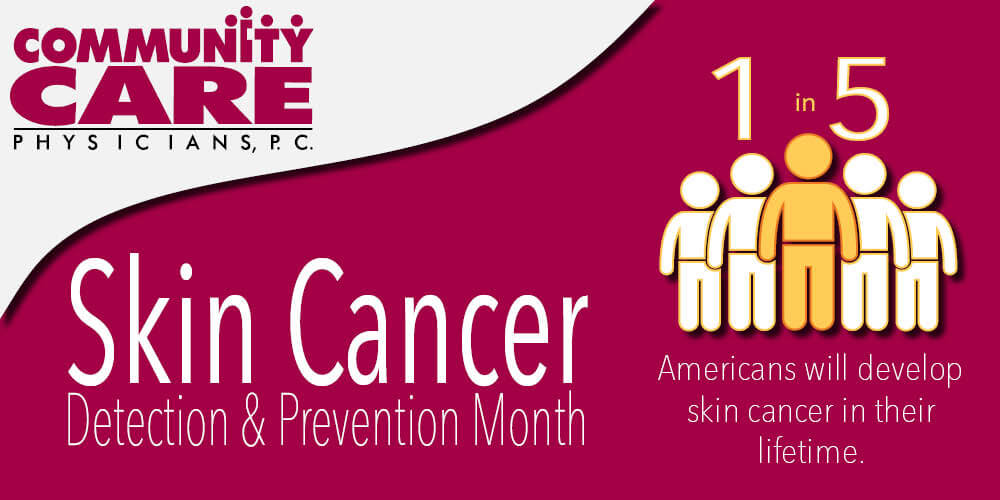
Every year in the U.S., nearly 5 million people are treated for skin cancer and over the past three decades, more people have had skin cancer than all other cancers combined, according to the Skin Care Foundation. Skin cancer is the most common cancer in the United States. You don’t need any x-rays or blood tests to find skin cancer early, but you can use skin exams to protect yourself and your family.
What Are the Types of Skin Cancer?
There are three main types of skin cancer – basal cell carcinoma, squamous cell carcinoma and melanoma. Basal cell and squamous cell carcinoma are the first and second most common types of skin cancer and are usually slow growing, while melanoma, the most serious form of skin cancer, can be aggressive if not identified early.
What is Melanoma?
Melanoma is the dangerous form of skin cancer. One person dies of melanoma every hour and 1 in 50 men and women will be diagnosed with melanoma of the skin during their lifetime. These cancerous growth develop when unrepaired DNA damage to skin cells, usually caused by ultraviolet (UV) radiation from the sun and tanning beds, triggers mutations that lead the skin cells to multiply rapidly and form cancerous tumors.
What Causes Melanoma? Am I At Risk?
Everyone is at risk of melanoma due to exposure to the sun. However, those who are at increased risk of melanoma are:
- Those with a family history of melanoma and those who have had melanoma before are at increased risk of recurrence.
- People who have had basal cell carcinoma or squamous cell carcinoma.
- Those who have been harshly exposed to UV rays and the sun and develop blistering sunburns in early childhood as well as adulthood.
- People who live in locations that have more sunlight such as Florida, Hawaii, and California.
- Those who have atypical moles known as dysplastic nevi.
- Individuals with fairer skin tones.
- Those individuals with a compromised immune system as a result of chemotherapy, an organ transplant, excessive sun exposure, and diseases such as HIV/AIDS or lymphoma.
How Can We Detect Melanoma?
ABDCE’s of melanoma
A- moles that are asymmetrical are concerning for melanoma
B- the borders of an early melanoma tend to be uneven
C- moles having a variety of colors is a warning sign
D- moles larger than a eraser on a pencil tip are concerning for melanoma.
E- moles that are evolving or changing in any way can be dangerous
Is Melanoma Treatable?
If melanoma is recognized and treated early, it is almost always curable, but if it is not, the cancer can spread to other parts of the body, where it then becomes hard to treat and can be fatal.
How is Melanoma Treated?
If cancer is confirmed, there are many additional options for treatment, including surgical excision of the cancer by a plastic surgeon and/or radiation therapy.
How Can Melanoma Be Prevented?
There are several ways to lower your risk of developing melanoma. These include:
- Avoid using tanning booths or beds since these increase your exposure to UV rays, raising your risk of developing melanoma and other skin cancers.
- Always apply SPF 15 at the least when you know you will be exposed to the sun. Reapply every two hours.
- Avoid burning from the sun or tanning beds.
- Cover up with clothing when you're at the beach or exposed to harsh sunlight.
- Keep newborns and young children out of the sun and cover them from head-to-toe with sunscreen and protective clothing.
- See your dermatologist every year for a checkup.
How is Non-Malignant Skin Cancer Treated?
The latest technology is the diagnosis and treatment of non-malignant skin cancer is Mohs Micrographic Surgery. Mohs micrographic surgery is a highly effective and advanced treatment for certain types of skin cancer. Numerous studies have demonstrated Mohs micrographic surgery offers the highest cure rate with most non-melanoma skin cancers including primary and recurrent tumors.
Mohs micrographic surgery treats skin cancer using a highly specialized and precise technique. The dermatologist performs both surgical excision of the skin cancer in stages, one tissue layer at a time, and then immediately examines it under a microscopic until healthy, cancer-free tissue around the tumor is reached and all skin cancer cells have been removed. Mohs micrographic surgery offers the highest potential for cure – even if the skin cancer has been previously treated by another method.
Skin Cancer Screenings at Community Care Physicians
Skin cancer screenings are available at Latham Dermatology with Dr. Hillary Siebeneck and at Delmar Dermatology with Dr. Scott Deckelbaum.
Dr. Hillary Siebeneck is a board certified dermatologist and fellow of the American Academy of Dermatology. Dr. Siebeneck and her staff are dedicated to providing the highest quality of care in dermatology and to creating a comfortable and compassionate forum for patients.
Dr. Scott Deckelbaum, board certified dermatologist practicing at Delmar Dermatology on Delaware Avenue, is one of only a few physicians in the Capital Region of New York to offer the Mohs micrographic surgery for the diagnosis and treatment of certain skin cancers.
Skin Health at Community Care Physicians' Plastic Surgery Group
Dr. Adrian Przybyla, of The Plastic Surgery Center at CCP specializes in aesthetic plastic surgery, as well as reconstructive surgery to remove skin cancers in cosmetically sensitive areas like the face, ears and scalp to minimize any disfigurement and scarring after skin cancer surgery. Our office also exclusively offers patients ZO® Skin Health, Inc. skin care line. ZO Skin Health was developed by Dr, Zein Obagi, a world renowned Beverly Hills Dermatologist, to optimize the skin health of patients and many noteworthy celebrities. Unlike over the counter skin products, the ZO Skin Health line is formulated with ingredients to keep skin looking radiant and to reverse the signs of aging and is available only through physician offices.
Check out our skin care products to help reduce UV oxidative damage and protect against further sun damage.
